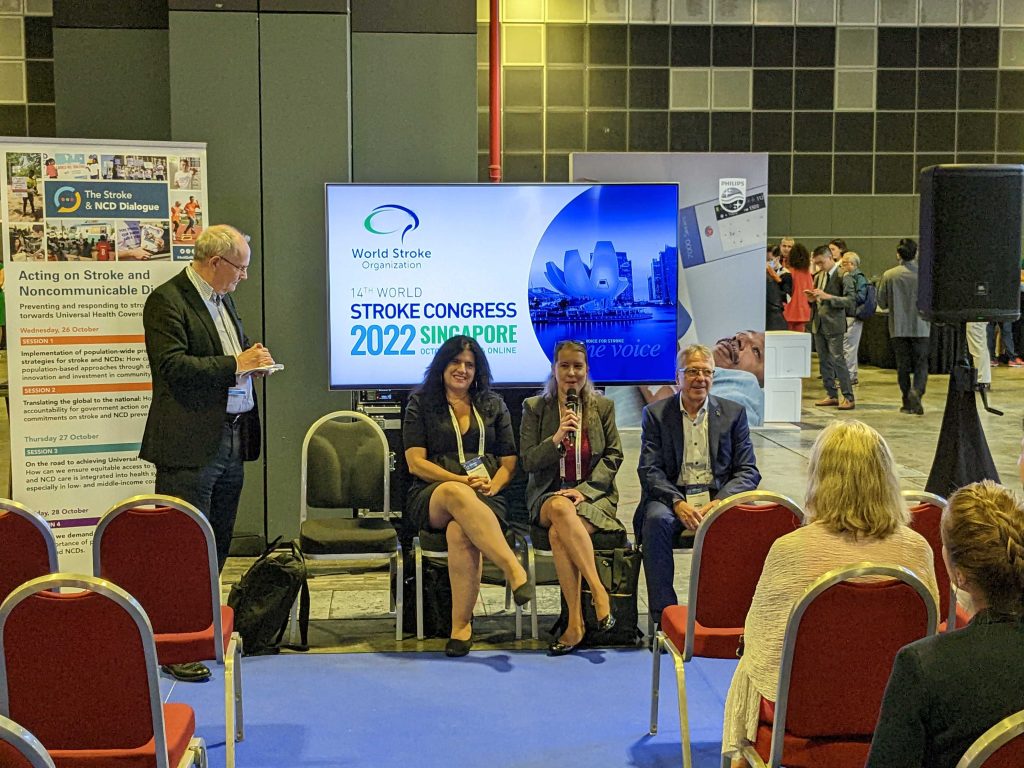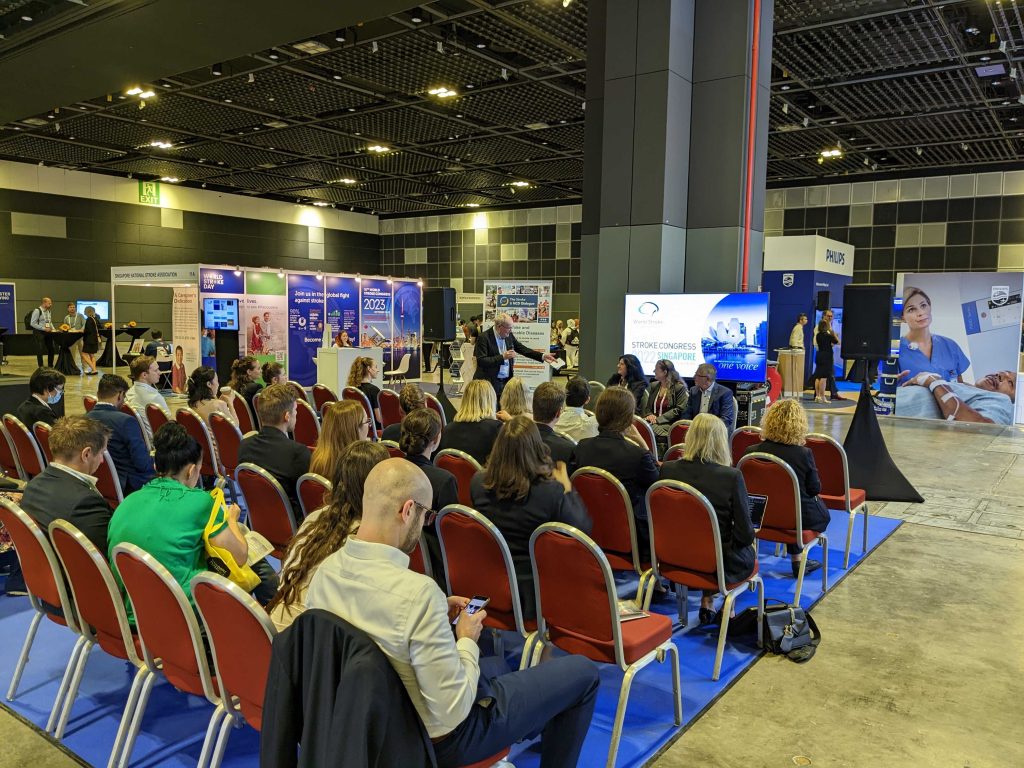NCD Dialogues
Join us in the Product Theatre (Exhibition Hall) during coffee breaks for informal and interactive discussions on stroke and other noncommunicable diseases (NCDs) between a range of stakeholders within the stroke community.
Session 1 on Tuesday 10 October - AM Break, 09:30-10:00 EDT
Meaningful engagement of People Living with Stroke: How can we ensure the involvement of stroke survivors and caregivers to keep Universal Health Coverage people centred?
Objectives:
- Showcase the impacts that people living with stroke can have on progressive achievement of UHC, such as through engagement with country UHC social accountability mechanisms.
- Explore the role of stroke support organisations (SSOs) to put lived experience at the centre of the stroke response at national and regional levels.
- Discuss how existing global advocacy tools and policy frameworks such as the Global Stroke Bill of Rights, WHO Framework for Meaningful Engagement of People
- Living with NCDs and Mental Health and Neurological Conditions and Global Charter on Meaningful Involvement of People Living with NCDs, can be used by the world stroke community whilst working with lived experience advocates.
- Carole Laurin (Stroke Survivor, Canada).
- Marina Charalambous (Founder of Cyprus Stroke Association, Cyprus
- Rosie Murton (Parntership and Membership Officer, NCD Alliance, UK)
Chair: Patrice Lindsay (Lead of Engagement and Stroke Strategies, Heart and Stroke Foundation of Canada, Canada)
Speakers include:
Session 2 on Wednesday 11 October - PM Break, 17:15 - 17:45 EDT
Including stroke and NCD prevention and care services across the continuum of care to achieve UHC: the role of Appendix 3 of the WHO Global NCD Action Plan.
Objectives:
- Highlight the importance of including stroke prevention as part of the entire stroke continuum of care into Universal Health Coverage (UHC) packages (as in the Appendix 3 of the WHO Global NCD Action Plan).
- Explain the importance of assessing the effectiveness of stroke prevention and care policies by regularly monitoring stroke incidence, mortality and prevalence at the individual and population levels.
- Explore options to support implementation and monitoring of Appendix 3 of the WHO Global NCD Action Plan in country NCD and UHC strategies, including tools such as the HEARTS package and WHO facility-based monitoring guidelines, and explore their effectiveness.
- Taskeen Khan (Department of Noncommunicable Diseases, WHO, Switzerland)
- Bo Norrving (Senior Professor of Neurology, Lund University, Sweden)
- Jeyaraj Pandian (Professor and Head of Neurology and Principal/Dean, Christian Medical College (CMC), Ludhiana, Punjab, India)
Chair: Liz Scanlon (Director, Regional Mission, Heart and Stroke Foundation of Canada, Canada)
Speakers include:
Session 3 on Thursday 12 October - AM Break, 09:30 - 10:00 EDT
Making the case for investment in quality chronic disease care: Reversing the rise of catastrophic out of pocket health expenditure to work towards UHC.
Objectives:
- Explain the need for financial risk protection against high expenditure of stroke and NCD-related services and explore disproportional impact of out-of-pocket costs on people living with NCDs in LMICs.
- Explore example countries where UHC has benefited people living with stroke and other NCDs against the impacts of catastrophic out of pocket health expenditure.
- Explore lessons learnt on developing investment cases for stroke in LMICs and outlining commitments made by Heads of State on financing in UHC Political Declaration.
- Gisele Sampaio Silva (Neurologist and Critical Care Physician, Brazil)
- Rita Melifonwu (Founder and CEO, Stroke Action, UK and Nigeria)
- Arvind Sharma(Head of Department of Neurology & Stroke Specialist, Zydus Hospitals, Ahmedabad, India)
Chair: Stephanie Mohl (Vice President, American Stroke Association, USA)
Speakers include:
Session 4 on Thursday 12 October - PM Break - 16:45-17:15 EDT
Achieving equality within access to stroke services: How can we ensure gender balance in treatment and care for people with stroke and NCDs in low- and middle-income countries?
Objectives:
- Identify examples of where women and girls are disproportionately affected by challenges in accessing stroke and/or other NCD services and highlight the importance of addressing these challenges.
- Explore how we can generate more research, knowledge and advocacy work towards addressing the challenges in gender equality in access to stroke services.
- Suggest policy recommendations to help address the significant barriers that women face to access timely, adequate, or affordable health screening and care for stroke and other NCDs, including suggestions on how to better integrate NCD prevention and care policy into other global development agendas and sustainable development goals such as gender equality.
- Valeria Caso (Stroke Neurologist and Professor in Neurology, University of Perugia Stroke Unit, Italy)
- Amal Al Hashmi (Founder and President of the Oman Stroke Society, Oman)
- Ivy Sebastian (Neurologist, India and Fellow, Stroke, Foothills Medical Centre, University of Calgary, Canada)
Chair: Bo Norrving (Senior Professor of Neurology, Lund University, Sweden)
-
Speakers include:
The Stroke and NCD Dialogue is co-hosted by NCD Alliance, World Stroke Organization, American Stroke Association and Stroke Foundation of Canada.

